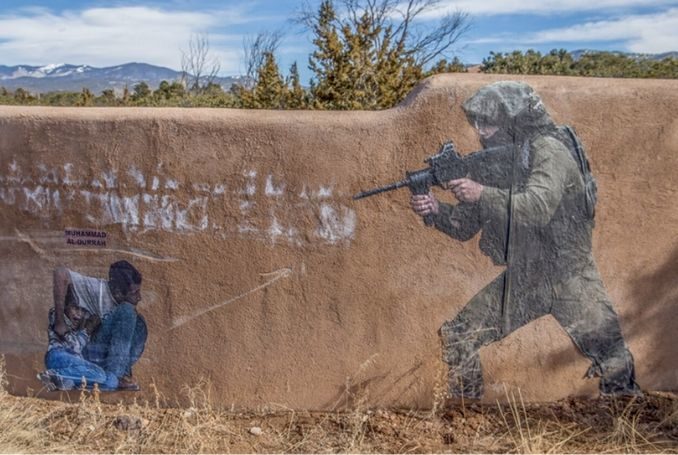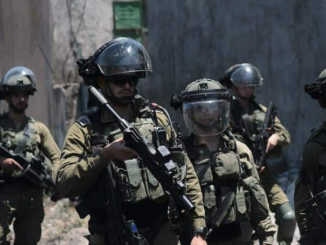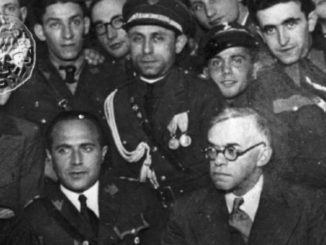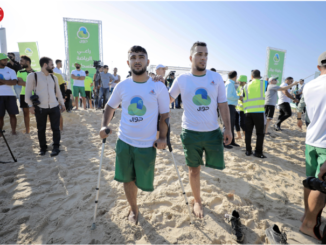
By Benay Blend
January 27, 2020, was International Holocaust Remembrance Day, the 75th anniversary of the liberation of Auschwitz, the end of a traumatic era that should have turned “Never Again” into a commitment to uphold the Universal Declaration of Human Rights (UDHR) for all people.
Quoted above, Navajo artist Remy explains why this is not so. Creator of the pro-Palestinian murals in Santa Fe, New Mexico, that have led to controversy, he calls for global resistance against those who seek to “exterminate” the colonized.
Growing up there were very few families that I knew who didn’t have at least a few survivors with numbers on their arms. Among my relatives, those who bore the legacy of the camps seemed to live in shadows. What I remember is that when we visited, which was rare, their shades were drawn, the lights were dimmed, and that is pretty much all that I recall. Memory plays tricks as we grow older. Perhaps those events did not occur at all, but their remembrance serves as a foundational distaste for atrocities committed against other groups of people to this day.
Miko Peled, an Israeli activist and author, claims that commemorating the Holocaust in Palestine, where the remains of Deir Yasin are visible from Israel’s Holocaust Museum, is wrong. He suggests, instead, traveling to Europe to visit the extermination camps, where millions of dead will always warrant remembering.
Moreover, as Nigel Parry writes, until Palestinians are free, the protocols of the international human rights legal framework are “daily undermined.” I would take that several steps further and include the necessity of ending the Occupation, granting the legal right of return, and agreeing to one secular state with equal rights for all.
Indeed, as Gazan activist Ahmed Abu Artema writes, Palestinians are not “striving to improve the conditions of their imprisonment,” as allegedly proposed by Trump’s plan for the Middle East. Instead they “want the return of our refugees and the end of the occupation.”
Because the Nakba of 1948, the equivalent of the Holocaust for the Palestinians, is ongoing, it should be commemorated on Remembrance Day. So, too, all of those histories that are under siege struggling not to be erased.
In this vein, an OpEd by Elena Ortiz, Ohkay Owingeh tribal member and chair of the Red Nation-Santa Fe Freedom Council, calls attention to the uproar caused by a pro-Palestinian mural on a stucco wall along the Santa Fe Trail created by Navajo artist Remy.
In her article, Ortiz draws connections between Palestinian children detained under the Israeli court system; immigrant children kept in cages on the U.S. borders; and Indigenous people in the Americas as well as enslaves peoples—both of whom have been subjected to genocide.
What draws all of these groups together is the common thread of settler colonialism, and as Ortiz makes clear, its effects on Indigenous peoples. If we were to draw attention to all of these erased histories not only on Holocaust Remembrance Day but throughout the year, that would be a powerful statement.
If we not only issue statements of solidarity but acted on that as well, what would that resistance look like? It might change the focus from the electoral process, running very strong in America right now, as it does every four years (and often in-between) to a global movement based instead on decolonization, a restructuring of society based on very different values.
Instead of a foundation based on “rights,” what Steven Salaita terms a “nebulous” framework which exists as “the classic idiom of state-sanctioned activism,” the goal instead might be one of liberation and the end of the settler-colonial state.
To return to Remy’s quote, his murals show why there will be no extermination. “We’re not huddled in one place,” he explains, we span the world.” More than technology, more than “a people or an army,” Remy says, “we’re a culture. We’re an idea,” an entity that can’t be killed. “To the racists” who destroyed “images of Indigenous struggle while living on stolen Tewa Land,” he warns:
“This was never about a single wall in your bourgeoisie, upper class, institutional art city. Our resistance is global therefore, so are we.”
If those who desecrated Remy’s wall really read this, perhaps they would understand that their version of the Holocaust leaves out the ethnic cleansing and genocide of Indigenous people, both here and in Palestine.
Moreover, by erasing his murals, they are actively promoting the erasure of that history, and with that, contributing to a genocide that continues to this day. As Remy’s following quote makes clear:
“The folks who weren’t understanding of that or who wanted to take knives to the images, I think that’s an extension of their families’ legacies in terms of westward expansion. I think the legacy, the history of westward expansion still lies in the DNA of people who are here and that’s in the destruction of our murals. We’re not on the same page, and that’s why I decided to go outside all of that.”
In Israel, Palestinian culture—food, clothing, language—is appropriated and commodified by the colonial state. Here Nadia Elia reports, as a settler-colonial state, Israel has sought to deny the existence of Indigenous people by appropriating Palestinian culture, a way of life that is rooted rather than imported. Indeed, falafel, hummus and olive are now claimed as local “Israeli” cuisine.
In the Southwest, too, in Santa Fe, in particular, Remy notes that the elite are fine with Indigenous art as long as its part of Indian Market, a tradition, too, that commodifies culture to conform to the tastes of the dominant group. “We’re OK to exist,” Remy claims, “but only if it’s under glass.”
If “Never Again” is to mean anything, it has to include allying with minorities, refugees, and all the Indigenous and disenfranchised around the world who are struggling for liberation.
– Benay Blend received her doctorate in American Studies from the University of New Mexico. Her scholarly works include Douglas Vakoch and Sam Mickey, Eds. (2017), “’Neither Homeland Nor Exile are Words’: ‘Situated Knowledge’ in the Works of Palestinian and Native American Writers”. She contributed this article to The Palestine Chronicle.

– Benay Blend earned her doctorate in American Studies from the University of New Mexico. Her scholarly works include Douglas Vakoch and Sam Mickey, Eds. (2017), “’Neither Homeland Nor Exile are Words’: ‘Situated Knowledge’ in the Works of Palestinian and Native American Writers”. She contributed this article to The Palestine Chronicle.









Kudos to Ms. Blend! Viva Palestine! Palestine Is Still THE Issue!